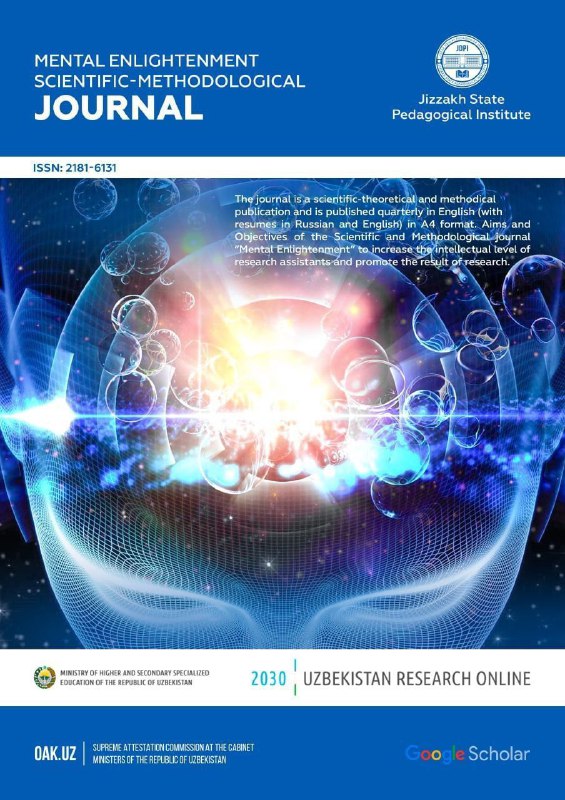Аннотация
The aim of the study is the theoretical substantiation and practical development of an invariant model of technology for organizing and conducting games in foreign language classes with adults based on linguistic material and simulating an authentic situation of communication. Research methods are complex. Among them, first of all, theoretical methods: analysis of psychological, didactic and methodological literature; analysis of the program for oral and written speech of the English language, observation and questioning, generalization of pedagogical experience; experimental: diagnostic methods, methods of processing experimental data. The results of the study is approved by efficiency of communicative games in foreign language classes as an integral element of the process of forming communicative skills which will increase both the level of communicative competence and the degree of proficiency in language material. The possibilities of using gaming technologies in teaching a foreign language to adult participants in the educational process are disclosed in detail. The main functions of games that are implemented in foreign language classes with adult students are analyzed: educational, motivational, diagnostic, correctional, organizational, developmental, educational, communicative, therapeutic, intercultural and interethnic communication, etc. The most common criteria underlying the development of a typology of gaming technologies in a foreign language lesson: type of activity, number of participants, purpose, degree of complexity, form of conduction, method of organization, orientation to the process or result, applied mechanisms.
Как цитировать
Библиографические ссылки
. Bim-Bad B.M. Pedagogical encyclopedic dictionary. Moscow: Bolshaya Ros. Encycl., 2002. 528 p.
. Ushinsky K.D. Selected pedagogical works: in 2 vols. Moscow: Uchpedgiz, 1954. Vol. 2. 656 p.
. Makarenko A.S. A book for parents: Lectures on the upbringing of children. Moscow: Education, 1969. 359 p.
. Vetchinova M.N. The use of gaming technologies in teaching a foreign language at the turn of the 19th–20th centuries. // Scientific notes. Electronic scientific journal of the Kursk State University. 2018. No. 3 (47). pp. 1-4.
. Ryzhikova E.P. Scientific and pedagogical conditions for studying a foreign language in the system of andragogy: author. dis. ... cand. ped. Sciences. M., 2001. 22 p.
. Kabakchi M.K. Teaching adults the lexico-grammatical side of speech in English in the conditions of short-term courses: author. dis. … cand. ped. Sciences. SPb., 2002. 24 p.
. Maron A.E. Practical andragogy. Book. 5. Open adult education. St. Petersburg: URAO IOV, 2012. 400 p.
. Bakhmeteva I.A., Vetlugina M.A. The concept of "Gamification" / "Gamification" in modern scientific and pedagogical discourse // Education and pedagogical sciences in the XXI century: topical issues, achievements and innovations. Penza: Science and education, 2017, pp. 233-236.
. Efimova R.Yu. Organizational and educational games in foreign language lessons // Innovative projects and programs in education. 2011. No. 6. P. 58-64.
. Filimonova Yu.V. Game technologies in foreign language classes // Yaroslavl Pedagogical Bulletin. 2006. No. 1. P. 74-79.
. Misheneva Yu.I. Game technologies as a means of teaching professional foreign language communication to students of non-linguistic universities // Concept. 2014. No. 21. P.41-45.
. Konysheva A.V. Game method in teaching a foreign language. St. Petersburg: Karo, 2006. 192 p.
. Varenina L.P. Gamification in education // Historical and social educational thought. 2014. V.6. No. 6. Part 2. P. 314-317.
. Milrud R.P. Lessons of language pedagogy: between the past and the future. URL: http://iyazyki.prosv.ru/2014/11/language-pedagogy/ (date of access: 24.02.2020).
. Galskova N.D., Gez N.I. Theory of teaching foreign languages. Linguodidactics and methodology. M.: Publishing Center "Academy", 2005. 336 p.
. Ivanova V.I. The use of role play in teaching adults in short-term foreign language courses (KKIA) // Siberian Pedagogical Journal. 2012. No. 3. P. 81-86.
. Glukhikh Ya.A. Development of communicative and linguoculturological competence in the process of teaching foreign languages // New paradigm of social and humanitarian knowledge. Murmansk: Murmansk State Technical University, 2018, pp. 112-114.
. Shatilova A.A. Game as a technology for teaching adults a foreign language // Teacher of higher education: traditions, problems, prospects. Tambov: Derzhavinsky Publishing House, 2019, pp. 228-235.
. Yarmatova Dilrabo,Traditions of Ethics in the literature and breaking from it. 25.05.2020 Warshaw Poland “Polish Science Journal” 132-135 Volume-2
Авторы
Dilrabo Yarmatova
Jizzakh State Pedagogical University
Ключевые слова:
games, adults, experience, andragogue, communicative, educational, communicative, sociocultural, social skills, negotiation skills, relative complexity, psychological, pedagogical characteristics.Выпуск
Раздел: Статьи
Copyright (c) 2023 Журнал иностранных языков и лингвистики

Это произведение доступно по лицензии Creative Commons «Attribution-ShareAlike» («Атрибуция — На тех же условиях») 4.0 Всемирная.


